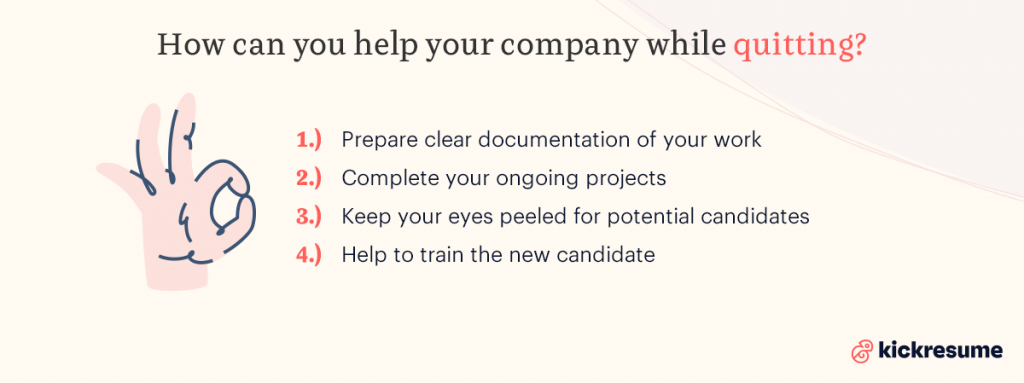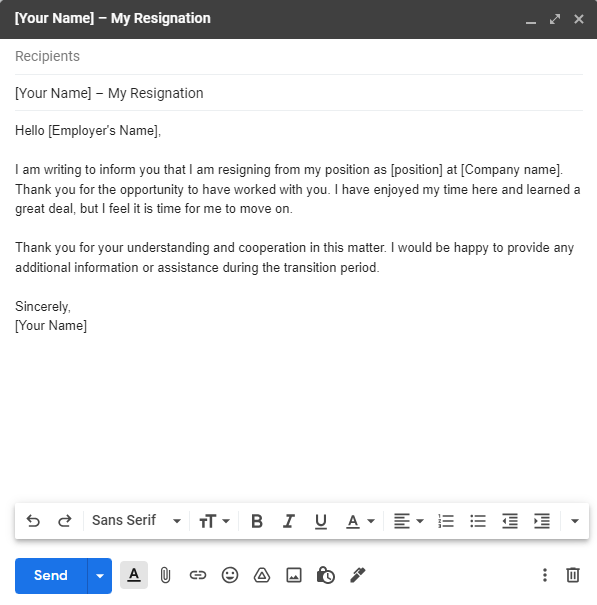How To Tell Your Manager You Re Quitting

Considering resigning from your current position? Navigating the conversation with your manager requires careful planning and execution.
This article provides essential guidance on how to inform your manager of your departure, ensuring a smooth transition and maintaining professional relationships. Follow these steps to resign effectively.
Preparation is Key
Before speaking with your manager, finalize your decision. Ensure you have a signed offer letter from your new employer, confirming your start date and terms of employment.
Draft your resignation letter. Keep it concise and professional, stating your last day of employment. Mention your role and express gratitude for the opportunities provided (even if the sentiment feels forced).
Timing and Delivery
Schedule a private meeting with your manager. Email or a quick face-to-face request is usually sufficient.
Choose a time when you can speak uninterrupted. Avoid Mondays or Fridays, and opt for mid-week when possible. Aim for late morning or early afternoon to avoid disrupting the start or end of the workday.
The Conversation: Delivering the News
Be direct and professional. Begin by stating your intention to resign. For example: "I am writing to inform you of my decision to resign from my position as [Your Job Title], effective [Your Last Day of Employment]."
Maintain a positive tone. Even if you are leaving due to negative circumstances, avoid negativity during this conversation. Focus on personal growth or new opportunities.
Be prepared to answer questions. Your manager may ask about your reasons for leaving or your future plans. Keep your responses brief and professional, avoiding overly detailed explanations.
The Resignation Letter: Formalizing Your Departure
Present your resignation letter during the meeting. This formalizes your departure and provides a written record for HR.
The letter should reiterate your last day of employment and express gratitude. Include your contact information in case they need to reach you.
Addressing Transition and Responsibilities
Offer your assistance during the transition period. This demonstrates professionalism and commitment to your team. Suggest ways you can help train your replacement or document your processes.
Be prepared to discuss your remaining responsibilities. Your manager may ask you to prioritize certain tasks or complete specific projects before you leave. Be flexible and willing to cooperate.
Negotiating Your Departure (If Necessary)
In some cases, your manager may attempt to negotiate your departure. They might offer a raise, promotion, or other incentives to stay. Consider your options carefully, but remember why you decided to leave in the first place.
If you are not interested in staying, politely decline the offer. Reiterate your commitment to your new opportunity and express your gratitude for their consideration.
Post-Resignation Etiquette
Maintain professionalism during your remaining time. Continue to perform your duties to the best of your ability and avoid gossip or negativity.
Work collaboratively with your colleagues to ensure a smooth transition. Document your processes, train your replacement, and answer any questions they may have.
Before leaving, thank your colleagues and express your appreciation for their support. Keep in touch with those you value and maintain your professional network.
Legal and Ethical Considerations
Review your employment contract and any non-compete agreements. Ensure you understand your obligations and avoid violating any legal restrictions. Consult with an attorney if you have any concerns.
Be mindful of confidentiality agreements. Avoid sharing sensitive information about your former employer with your new company. Maintaining confidentiality is crucial for preserving your professional reputation.
Exit gracefully. Leave on good terms and avoid burning bridges. You never know when you might cross paths with your former colleagues or employer again.
Ongoing Developments and Next Steps
After resigning, confirm your resignation in writing via email, summarizing key agreements made during your conversation with your manager. This will serve as a written record. Continue to fulfill your responsibilities diligently during your remaining time.
Prepare for your exit interview, gather necessary documents, and ensure all personal belongings are removed from your workspace. Ensure all outstanding payments are accurate and address any discrepancies promptly.




:max_bytes(150000):strip_icc()/how-to-tell-your-boss-you-re-quitting-your-job-2063035_FINAL-5b88037cc9e77c002cc6f46c.png)













